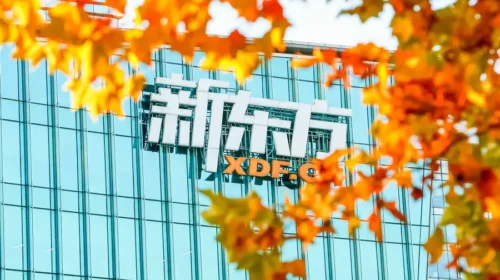Readboy Tries Again for IPO but Faces Tough Test from Edtech Rivals

The maker of learning devices for children has filed for an IPO at the Hong Kong Stock Exchange for a third time, but an old-school operating model could weigh on revenues
Key Takeaways:
- Readboy Education wants to raise money to buy companies up and down the supply chain and expand its sales network
- The company relies heavily on brick-and-mortar distributors, and faces daunting challenges from many new players adept at e-commerce marketing
By Molly Wen
Readboy Education Holding Co. Ltd. was among China’s pioneers of educational technology when digital devices first appeared in the classroom, with a slogan promising to turn its users into overachievers of the future. Two decades on, the company finds itself under mounting pressure in the smart learning market as ambitious rivals look to become top of the class.
Readboy has long since replaced its rudimentary reading machines with modern tablets, but, as the company seeks funding for business expansion in the future, it is still sticking to what it knows best – producing educational hardware.
Could it be third time lucky for the IPO-hopeful, just as sweeping regulatory changes may be putting investors off the education sector?
Institutes providing education services for school-age children have been pivoting to smart education hardware since last year, when China introduced a “double reduction” policy to ease the pressure of homework and after-school tutoring on stressed-out K-12 students. At a stroke, education companies lost a big revenue stream from extracurricular lessons and real-time learning events such as livestreamed classes.
Readboy, one of the most established companies in the sector, filed last Wednesday for an IPO with the Hong Kong Stock Exchange, saying it hopes to expand its distribution network by acquiring businesses up and down the supply chain that are a good fit with its operations.
Its earlier attempts in April and November last year faltered when the information provided was not enough to satisfy exchange officials. To succeed with its IPO this time, the company must ultimately persuade investors that it can adapt to the transformation in the education sector and still come out with top marks.
The company was founded in 1999 specializing in the design, manufacturing and marketing of
learning devices and systems for tech-enabled classrooms, later adding smart tablets and watches to its product range.
Readboy ranks as China’s second-biggest provider of learning devices and services by retail income, and the fifth largest in total shipments of goods, according to a research report cited in its prospectus.
Smart tablets are its signature product. The company made revenues of 813 million yuan ($122 million) in 2021, up nearly 11% from the year earlier, with 87% of the total coming from tablets.
The tablets are designed for school students aged six to 18 years of age and come with pre-installed learning materials.
Last year the company shipped 459,000 tablets, a dip from 485,000 tablets in 2020 and compared with 457,000 in 2019, sold in a price range of 2000 yuan to 5000 yuan.
The company’s profits have been lackluster, further battered last year by surging costs as supplies ran short of components such as integrated circuits, time-schedule controllers, microchips and monitors.
Gross margins in 2021 fell to 20.8%, from 27.5% the previous year and 26% in 2019. Net profit, meanwhile, came in at 82.15 million yuan, below 2020’s 92.01 million yuan and compared with 69.43 million yuan in 2019.
Bigger distribution network may not mean bigger sales
A traditional marketing system in which products were promoted on TV and sold in brick-and-mortar outlets catapulted the company to commercial success.
Now that e-commerce has changed the market dynamics, the old-school model risks falling short, although the company hopes its marketing strategy can succeed in finding new customers in relatively under-served towns and cities across China.
Readboy remains heavily reliant on offline transactions. Its revenue share from offline distribution was 85.5% last year, compared with 85% of revenues the prior year and nearly 92% in 2019.
The company has expanded its network to 132 offline distributors controlling 4,523 distribution points in 344 cities, 70% of which were third- or lower-tier cities, the so-called “sunken market” of potentially neglected or under-served markets. But adding sales outlets has not so far translated into bumper profits.
To keep up with the times, Readboy had started churning out content-based products. It also set up education research institutes and provided free teaching resources including livestreaming courses in 2017 to bolster the sales of its hardware devices.
However, after last year’s education services clampdown, it suspended livestreaming courses, replacing them with pre-recorded lessons. It also pulled the plug on developing premium paid courses that had been in the pipeline. The competitiveness of its devices suffered as a result, thwarting efforts to boost revenue from an existing user base.
Readboy has also diversified into smart education systems for schools that allow teachers to manage courseware online and interact digitally with students.
But this part of the business still accounts for only a small part of operations: making 23.6 million yuan in revenues in 2021, or 2.9% of the total, compared with 22.3 million yuan (3.1%) the year earlier and 8.2 million yuan (1.2%) in 2019.
The company also produces smart watches for students, a trendy new category of education gadgets. But declining orders meant the revenue share from the wearable goods business fell from 16.7% in 2019 to 4.3% in 2020 before rising to 6.6% in 2021, according to the prospectus.
New players swooping in
As the K-12 education sector faces more stringent regulatory scrutiny, many education providers have looked for alternative earners, with smart education hardware a popular choice. Internet companies investing in learning products and services are also joining the fray, making the field extra crowded.
Big companies have been muscling in since 2021. Baidu (BIDU.US; 9888.HK) came up with its Xiaodu intelligent learning tablet, a smart dictionary pen and an AI-assisted reading product for children. IFlytek (002230.SZ) launched an AI learning machine capable of grading papers. Zhangmen Education (ZME.US) unveiled a smart learning machine with materials for 10 subjects embedded in it. All in all, Readboy – the early innovator in edtech – is now under siege.
Before submitting its first IPO application last April, Readboy secured $15 million from Bull Capital Partners who in return got 4.16% of shares in the company, earning it a valuation of 2.4 billion yuan. IFlytek and Youdao (DAO.US) are two companies that have recently successfully launched their education hardware devices with respective price-to-sales (P/S) ratios of 4.3 times and 1.1 times. Using the average of the two (2.7 times) to calculate Readboy’s valuation, the company can expect an IPO valuation of 2.2 billion yuan, slightly lower than a year earlier.
The company has had to cope with more than 20 years of educational tech transformation, but will it secure the funds and find a smart strategy to face what could be its hardest test to date – competition from education and internet companies?
Investors will be watching closely to see if Readboy can achieve a passing grade.
To subscribe to Bamboo Works free weekly newsletter, click here






